In this article, we will discuss how a dog impacts your happiness and has a positive impact on your physical health, as well as a look into some popular dog breeds and their characteristics.
Introduction

If owning a dog is as fun as it is to have a human, then wow, you guys are lucky.
As well as the fun side of things, us dogs can offer you some pretty significant benefits regarding your health.
I might be biased, but I think of myself as having a lot to offer to my family, and I do my very best to support them in every way I possibly can.
I suppose that sometimes means I bark too loudly at the noises I hear outside, but as the alpha of the house, it’s my duty to protect, so what can you expect!
As well as offering top-rate guard-dog duties to ensure my human’s safety at all times, I also want my owner to be happy and healthy so that we can have the best relationship and go on the most exciting adventures together for a long, long time to come.
There are not just the benefits of having a family dog to consider, though, as I have furry friends who are holding steady jobs as working dogs and service dogs, making it their life’s mission to help their humans manage their mobility limitations.
As you can see, the health benefits associated with owning a dog are multifaceted.
Whether I am biased or not, the fact that the list of potential benefits of owning a dog is so long, speaks for itself.
There might be a few benefits that surprise you, but stick with me as your guide and I’ll teach you all you need to know about the health benefits of owning a dog.
How Dogs Have a Positive Impact on Your Mental Health
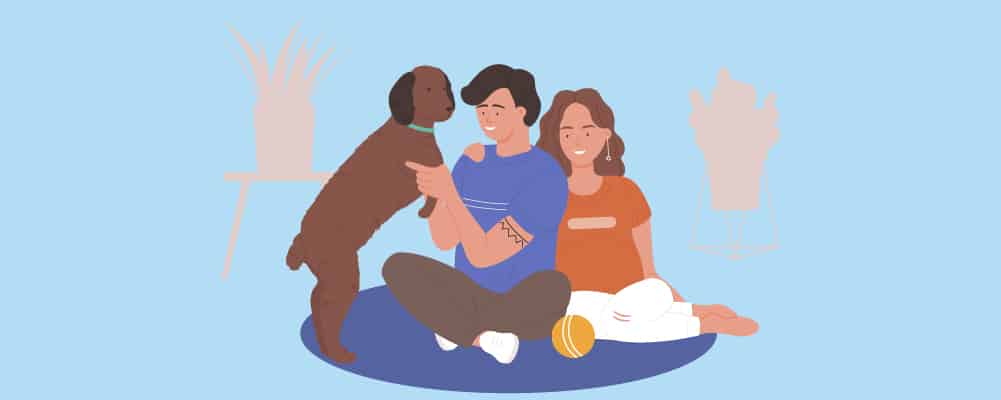 People have started to take mental health a lot more seriously in recent years, so there’s been more research into how to affect your mental health in a positive way.
People have started to take mental health a lot more seriously in recent years, so there’s been more research into how to affect your mental health in a positive way.
Owning a dog has been one of the things that have shown up repeatedly in these discussions, and there have been many studies into how dogs have a positive impact on your mental health.
Stave Off Depression
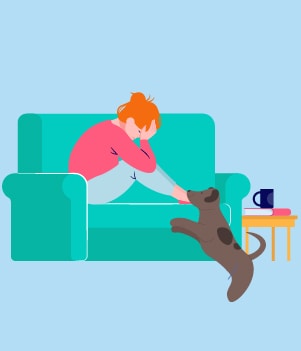
If you have ever struggled with your mental health or if you’ve experienced mental illness, you’ll know that there’s no quick fix for depression.
Unfortunately, you can’t expect that you’ll get a dog and suddenly everything will be back to being sunshine and rainbows.
With that being said, many people are the same in thinking that dog owners are less likely to experience depression than those without a canine companion.
It’s not hard to believe given all the health benefits of owning a dog, which you’ll learn more about throughout this article.
It’s not just dog owners who benefit, however, as meeting up with a therapy dog has been proven to be successful at helping to ease depression in people of all ages, whether they’re struggling with an illness or they’re perfectly healthy.
While there is evidence to suggest that certain demographics are less likely to experience depression when they own a dog, such as elderly women who live on their own, there are other groups of people who don’t see a huge improvement in their mental health just through owning a dog, as this obviously depends a lot on the person’s individual situation.
Adds Meaning and Purpose
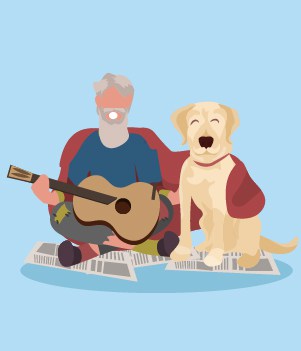
There’s a reason that many people cite their dog as being the only thing that’s pulled them back from the precipice, and why they make such great companions to the elderly or as therapy dogs.
Dogs bring meaning and purpose to our lives. They’re dependent on us to feed them, walk them, and generally make sure their needs are being met, which gives you as their owner a reason to get up each morning and a routine to follow every day.
As Kristi Littrell, Adoption Manager at Best Friends Animal Society in Utah put it, “they force people to continue to do things, so even if you’re not feeling well emotionally or physically, the dog doesn’t care.”
They care, of course, but they don’t demand anything of you or require anything in return aside from food, water, and occasional exercise.
Reduce Stress

Dogs are well-known for their positive effects on our stress levels, as spending time with your pet can alleviate feelings of anxiety and lower blood pressure.
This also naturally increases the level of two neurochemicals that have a huge influence over your well-being and promote a calm state, which is serotonin (yay! Happy brain chemicals!) and dopamine.
If you’re having a stressful time at work, coming home to your dog can be a great distraction from the worries of the day which can help ease some of the tensions from the office.
They can also be good at easing friction between married couples for a less stressful life at home.
You’ll also find it easier to perform tasks that you might otherwise find stressful and frustrating, and having a dog around tends to boost performance levels which is an added bonus.
Improve Your Social Life
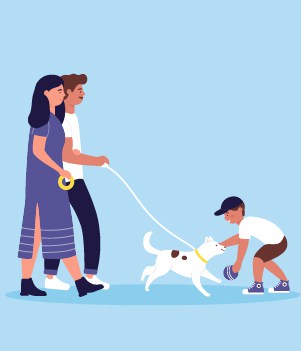
Supposed to meet up with a friend for a socially-distanced walk?
As good as the intentions may have been when it was arranged, it’s too easy to flake or cancel, especially when you’re feeling low.
But, when you have plans to meet up to take the dog for a walk in the park?
Who could say no to that!
For those who have a smaller circle of friends, to begin with, you’re actually likely to come across lots of new people when you’re out walking your dog, which makes it easier to meet and make friends which is something that gets harder as you get older.
Puppy training classes or all-age classes are a great way for dog owners to connect and arrange puppy play dates which can then turn into friendship.
Plus, it’s easy to find common ground with new people when you share the same love for your pets!
They say that dog is a man’s best friend, but it’s nice to know that owning a dog can lead to other friendships being formed over the bond of a shared love for their pets.
Most of the time – a good 4 times out of 10 – dog owners will stop and chat with other dog owners they meet on their walk which increases your social interaction.
The majority will be friendly and are often perfectly happy to stop and chat for a minute so you can briefly swap stories about your respective pets.
For some people, this may be one of the limited types of social interactions they experience on a day-to-day basis, so it can be really important and can have really positive effects on your mood and mental health.
Battle Loneliness

With a dog in the house, you’ve always got someone to come home to.
Your dog can be there for you when people aren’t, and these bundles of fur come with an abundance of unconditional love to share with you.
The Human-Animal Bond Research Institute conducted a national survey that looked at both pet owners and non-pet owners to see if there was any correlation between owning a pet and battling feelings of loneliness, with 85% of respondents agreeing that interaction with pets makes you feel less lonely.
There’s a reason that dogs are known as being man’s best friend.
For older people who live alone, dogs provide a great source of companionship which has been proven to help battle the loneliness that is sadly otherwise commonly reported amongst this demographic.
Dogs Help Us Cope With Crisis

Whether it’s simply the soothing presence of a pet or something more nuanced at play, owning a dog has been known to help humans cope in times of crisis.
People who have a service dog when dealing with conditions like PTSD will often show more physiological and psychological progression in a shorter space of time.
This was proven in a study that was conducted by Purdue University’s College of Veterinary Medicine which found that having a service dog led to a reduction in the number of PTSD symptoms experienced by military veterans and that they had better-developed coping skills.
Dogs Make Us Happier
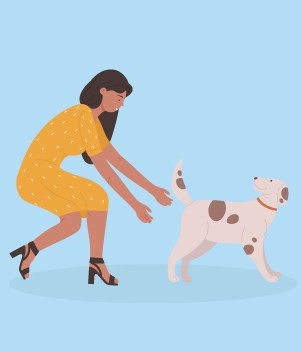
Have you ever experienced the sheer joy of catching your pet in the act of doing something stupid or silly?
Dogs are quick to put a smile on anyone’s face.
Looking into their eyes alone is enough to boost your body’s natural levels of oxytocin, also referred to as the “love hormone”, according to a study in Japan conducted in 2009.
There are so many different ways in which dogs are able to make us happier, including by providing ultimate comfort and companionship.
Dogs leave us with fond memories and funny stories to tell our friends and family, and there’s no better feeling than when your dog seeks out your lap to sit on or comes running up excitedly to greet you when you come home.
Training with your dog can also be a lot of fun, and this will strengthen the bond between you and your furry family member.
Whether you’re learning new tricks to show off or enjoying long walks and adventures with your pet, all areas of owning a dog can be a great source of happiness which is why so many people couldn’t imagine living without theirs.
Dogs Help Seniors With Cognitive Function and Social Interaction
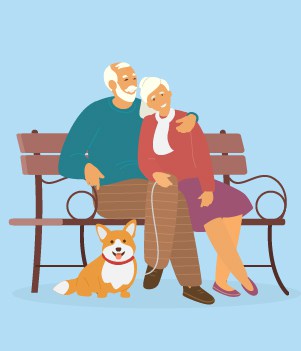
One topic we’ve circled back to a few times is how owning a dog can be of great benefit to older people, and we know this to be true when it comes to areas like cognitive function and social interaction.
On the cognitive functions side of things, the soothing presence of a dog can have welcome benefits including seeing a general improvement in people dealing with mental illness and fewer bouts of agitated behavior in elderly people that have dementia or similar conditions.
In terms of social interaction, we can all agree that it gets harder to broaden your social circle as you get older.
Elderly people in particular struggle to make new friends, but they have more opportunities for social interaction when crossing paths with them during walks.
More than anything, dogs can provide the ultimate source of comfort in a world that can be confusing making them the perfect choice of companion for seniors.
How Dogs Have a Positive Impact on Your Physical Health

As well as the ways in which dogs can positively affect our mental health, there are also a lot of ways that dogs improve our physical health as well, both inside and out.
Improve Heart Health
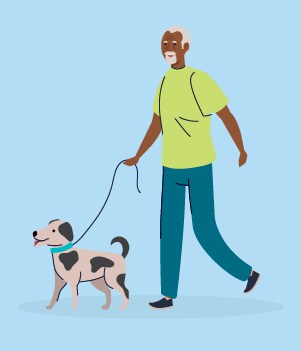
Your heart might feel like it’s about to burst every time your furry member of the family pads into the room, but dogs can actually make your heart stronger in the long run.
Research has shown that owning a dog can even have a positive effect on you by reducing blood pressure, reducing cholesterol, and decreasing triglyceride levels for improved cardiovascular health.
Dog owners are at a lower risk of suffering a heart attack, but even if you are unfortunate enough to experience one, people who own a dog are found to have better survival rates and a much quicker recovery period than a non-dog owner.
Great news for your dog, who I’m sure will be anxiously awaiting your return home to them!
Keep You Fit and Active
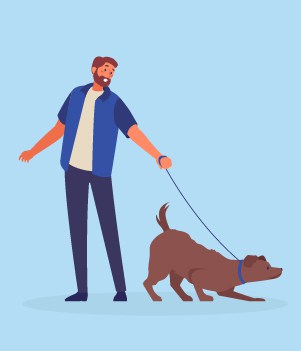
One of the most common weapons parents will wield in the battle of “can we get a dog?” is the whole “who’s going to end up walking it?
You do know they need to be taken out for a walk every day, sometimes twice (yes, even if it’s raining), right?” argument.
It’s a universally known fact that dogs require regular exercise, and this could be a great motivation for you to get your own daily steps in.
According to health professionals, adults should aim to do around 2 hours and 30 minutes of moderate exercise per week.
This is obviously going to be a much easier target if you’re taking your dog out for walks every day – they’re almost four times more likely than non-dog owners to meet this daily exercise goal, meaning you’ll be more fit and active which will have great health benefits.
It’s also a great way to explore new walking routes and to take advantage of the areas around you and what they have to offer, and your dog will appreciate the adventure of exploring a new walking trail or a more exciting path to follow.
You don’t have to be completing walks that are particularly lengthy right away – it’s fine to take your time and to build up your strength and stamina.
If you get your dog as a puppy, they’ll need to take it slowly themselves to begin with anyway so be careful not to overdo it.
Help You Lose Weight
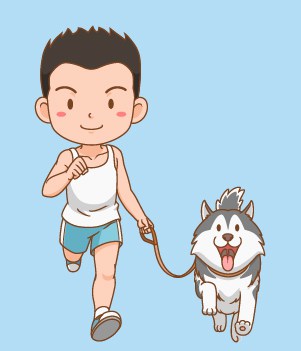
Research has proven that the key to healthy and sustainable weight loss is down to two things: you need to eat a balanced diet and you need to move your body more.
If you’re looking to lose a couple of pounds for health reasons, there’s no better way to start introducing some moderate physical exercise into your routine than by walking your dog.
Whether you nip out for three ten-minute walks per day or gradually work yourself up to 30 minutes in one stretch, you’ll be taking steps in the right direction on the path to improving your health through weight loss.
Puppies will need to be eased into longer walks anyway, as there’s only so far their little legs can take them at first. Let them learn to walk before they can run, as they say.
Knowing that your dog needs the walk too and having that responsibility is a great motivator in terms of getting people out of the house, making it feel less like exercise and more like a duty to your dog – they can’t walk themselves, after all.
As we said, you do still need to take into consideration your diet – all the walking in the world can’t help you if you aren’t feeding yourself the right nutrients and the right portion sizes for your needs, so make sure to work on both with equal dedication.
Prevent Grandkids Allergies

It was once widely believed that keeping a dog or some other type of furry pet in your home could worsen children’s allergies, or that your kids could become more susceptible to allergies in the first place.
More recently, studies have shown that it is in fact the opposite.
The chances of developing an allergy to household animals were found to be up to 33% lower for children who lived with cats or dogs according to a 2004 study in the Journal of Allergy and Clinical Immunology.
Instead, their immune systems are strengthened which proves this former theory incorrect, joining low-rise jeans and over-the-knee denim skirts in the list of other things we got wrong in the 90s.
There are a number of other ways in which owning a dog can be beneficial to children, as it teaches them a lot about compassion which helps them develop better relationships with people.
They can also provide support and comfort and can be a source of stability for children, easing them into how to cope with situations where their parents are not immediately present.
Reduce Doctor Visits

Another great thing about owning a dog is that it’s been linked to seeing a reduction in the number of times you pay a visit to your doctor, which is likely the combined result of both the mental and physical benefits of owning a dog as detailed thus far throughout the article.
Studies have shown that dog owners over the age of 65 visit their doctors around 30% less often than those without a pet, with one particular study in the Journal of Personality and Social Psychology reporting that Medicare seniors from this demographic had “fewer doctor contacts over the 1-year period than respondents who did not own pets,” and that “dogs, in particular, were buffered from the impact of stressful life events on physician utilization.”
Battle Disease and Injury

It’s long been believed that dogs are able to detect, treat, and manage, a number of different types of illnesses including the following:
- If they have been trained to do so, some dogs are able to detect cancer of the kidneys, bladder, and prostate, to name a few.
- For certain medical conditions, like in the case of traumatic brain injury, autism, or rheumatoid arthritis, service dogs can help improve mobility and are therefore a great aid in regaining independence.
- Therapy dogs provide a great source of companionship for people with Alzheimer’s and they can reduce the number of emotional or aggressive outbursts that patients experience.
- Therapy dogs can also help people dealing with trauma work through their issues and they have had great success in helping the recovery of people suffering from post-traumatic stress disorder.
Working Dogs – Blindness, Autism, Therapy Dogs, Epilepsy, and Alert Dogs
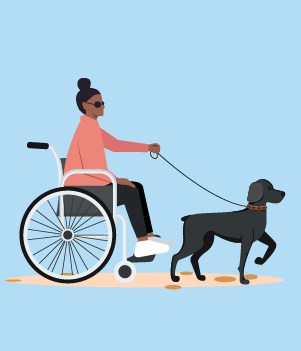
One of the amazing things about dogs is how smart they are, and how certain breeds can be trained to help people manage a number of illnesses and conditions.
From support to the ability to detect an oncoming attack, there are various types of working dogs that help a lot of people live their lives better.
People with autism might find it easier to connect with a pet than they are able to with a person, as they share a similar reliance on non-verbal cues for communication.
They can then build upon the social interaction skills they’re practicing with their pet and it can develop their ability to navigate social interaction with other people, helping them towards independence.
Guide dogs, or service dogs as they’re otherwise called, are specially trained to provide a level of assistance that enables the mobility of their owner so that anyone who is visually impaired or blind will be able to safely recognize when to stop at the curbside, how to avoid potential dangers or safety hazards, and how to manage crowds of people.
For someone who has epilepsy, one of the dangers of having a fit is that it’s hard to predict when an attack will come on.
To help assist them in the case of an emergency, seizure dogs are trained to respond to epileptic seizures which can involve barking to warn their owners of an oncoming seizure, moving their owner into a safe position so they don’t hurt themself while they’re seizing, and pressing an alarm to call for medical assistance.
Why Do We Love Dogs so Much?

Why do we love dogs so much?
It’s a question you may have asked yourself before because there’s no denying that we love our pets as much as if they were part of the family, which they very much are in most cases.
But what causes this strong emotional connection to our pets?
Dogs Make You More Attractive – Even Virtually
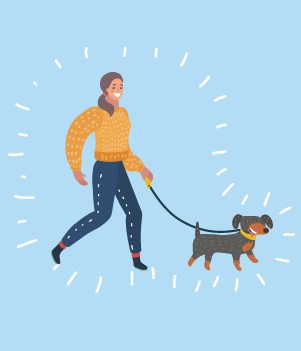
We’ve definitely all swiped right on Tinder before just because they have a photo where they’re posing with a dog on their profile, so don’t worry, you’re not the only one.
Not only do people tend to look more relaxed and comfortable when they’re posing with their pet, which naturally makes them come across better to a potential partner, but the very presence of a dog can subconsciously make us more attracted to someone.
When women put up a picture with a dog on their online dating profile, they were found to do better than men for the most part and had a higher ‘swipe right’ success rate.
With that said, research has shown that men who have a dog with them at the time are far more likely to successfully get a woman’s number, so it turns out that everyone does well on the attraction spectrum when there’s a dog thrown into the mix as an added bonus.
There’s just something about photos of dogs that people love, with 65% of dog owners confessing to capturing more moments of their dog than of times spent with their partner.
You only have to scroll through Instagram or TikTok to see the high volume of engagement and traction that pet pics receive, but at least all those photos you’re taking you’ll have plenty of pet pics of your own to post.
Dogs Are So Adorable They Make Us Love Them

Who doesn’t love dogs?! They’re. Just. So. Adorable. Quite literally.
Dogs possess “infant schema” facial features which play on our maternal or paternal instincts, and so humans automatically take on a caregiver role because of this triggered response.
All it takes is looking into those puppy dog eyes, as this gives your oxytocin hormone levels a natural boost and makes your bond feel much stronger and closer, similar to that of the hormone that forms the special bond between a mother and her newborn baby.
Have you ever noticed yourself or someone else talking to your dog in a put-on babyish voice?
It’s hugely common for people to speak to their pets this way, and dogs have actually evolved to scientifically appeal to humans in this regard.
So, remember that there’s a certain amount of history to that cocked head butter-wouldn’t-melt look your pooch can give you, and there’s science to back it up.
Do Dogs Love us Back?
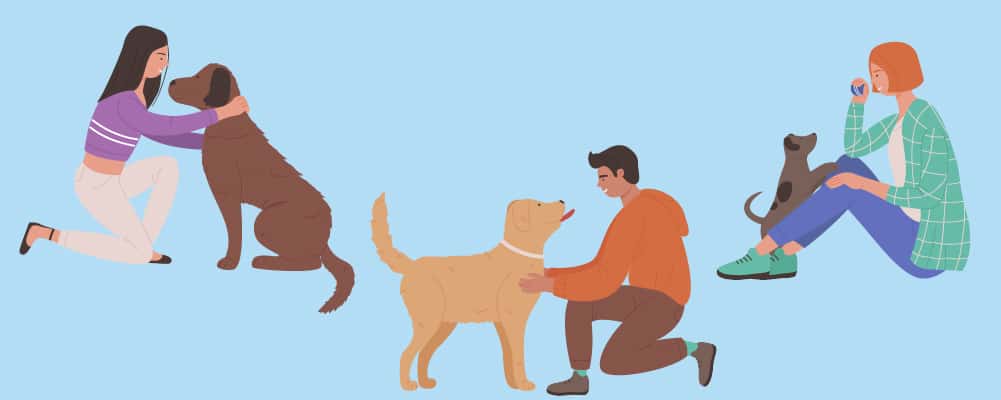
You’ll be thrilled to know that in the same way we view our dogs as furry little members of the family, dogs, in turn, see us as part of their own family or as their ‘pack’, so they do more than just love us.
In fact, when looking at the MRI scan results of a dog’s brain when they were presented with both strange and familiar smells in a neuroimaging study by scientists at Emory University
In fact, there was a study about neuroimaging that was conducted by scientists at Emory University which examined the MRI scan results of a dog’s brain when they caught the scent of their owner, as it showed the reward center exploding with activity in excitement at the association.
With such a strong reaction, you can be confident in thinking that your dog definitely does love you back.
Choosing the Correct Breed to Fit Your Lifestyle

We all know the saying – a puppy is for life, not just for Christmas/a birthday/an anniversary, or whatever the occasion may be.
As such, it’s important that they fit in with your current lifestyle, or you better be prepared to make some changes, because it would be unfair to bring a dog into your life if you’re unable to give it what it needs to be healthy and happy.
It’s not always the intention, of course – when they’re puppies, all breeds look manageable.
With their faces all scrunched up and their teeny tiny paws padding along the floor, it’s no wonder people forget to consider whether a certain breed will actually fit their lifestyle.
However, choosing the right breed for you and your habits is one of the most important considerations if you’re thinking about owning a dog, so think carefully about the following factors and think carefully about the changes you would be prepared to make, and realistically what you would be able to stick to for an extended period of time.
A good breeder will allow you to see the puppies and the environment they’ve been bred and brought up in for the first 8 to 10 weeks of their lives.
You’ll be able to meet the mother and they should be able to answer any questions you may have, as well as providing all the necessary paperwork such as the relevant health tests and details about microchipping.
A great breeder will ask you questions about your lifestyle, your home, and your working hours in order to ensure that it’s a good match and that you’re capable of handling the needs of your new puppy beyond the initial cuteness stage.
If you’re considering adopting a dog from a shelter (props to you!
There are far too many deserving dogs in the world without homes), you’ll also have to prove that you have the right type of lifestyle for the dog you’re hoping to adopt.
Someone from the shelter may even visit your home, although it’s lifestyle rather than living arrangements they’re looking at.
This should underscore that it’s important to really take on board the needs of your chosen breed before deciding to bring one into the family, as family should never get left behind because you find yourself realizing that it’s not the best fit for your lifestyle. Too little, too late.
Active
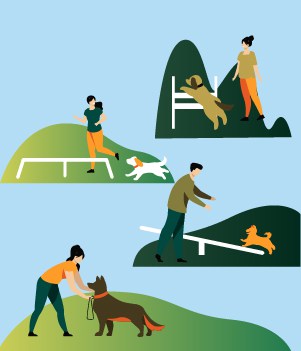
Are you an active person? … honestly? We don’t just mean for the occasional run whenever you feel a spurt of motivation (or more realistically, guilt) hitting.
If you choose an active breed, your dog will need walking for upwards of 1 or 2 hours at the very least every day, which is certainly less enjoyable during harsher weather conditions, yet it can lead to mischievous behavior from your dog and acting out if they are cooped up for too long.
If the thought of walking for that long sounds like your idea of absolute hell, and you don’t have huge acres of land where your dog can run around for exercise, then you might want to consider a smaller, less active type of dog breed that doesn’t need to be taken for quite such long walks.
Alternatively, if you’re rescuing you might consider an older dog that can’t keep up with a vigorous exercise regime anyway.
Think carefully about your decision and do your research well before-hand so you know the pros and cons of different breeds.
Also, be realistic about what you can actually commit to, as it would be unfair to get a dog that you quickly realize you’re unable to care properly because they’re too high-maintenance.
This isn’t a shopping mall and you can’t exchange or return for a refund, so get it right for you the first time around with a dog that suits your lifestyle.
Working Dogs
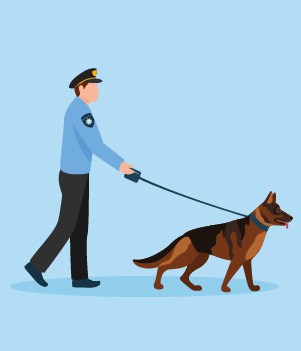
I’ve already expressed my admiration for the level of intelligence that some dogs have, as they are capable of so many different things, with many different benefits.
Here are a few of the great things that working service dogs can do:
- Guide dogs can help get a blind person’s mobility back to a point where they can safely operate by themselves and live with a reasonable level of independence.
- Service dogs can also assist with mobility for people who are in wheelchairs or are physically limited in some way. They will have been trained to be able to access doors and cupboards, can fetch things for their owner, and carry things when they are unable to.
- Hearing dogs, also known as signal dogs, will alert their owner if they hear certain sounds such as somebody at the door or when someone enters your home.
- Dogs that are trained to assist with autism are able to help their owner pick up on sensory signals, for example, if a fire alarm was to go off, and they can make them aware of compulsive behaviors or when they’re at risk of becoming overstimulated.
So, you can clearly see that the benefits of owning a dog go beyond just the traditional family pet and the ways in which they can enrich your life to include real-life working results that are helping people manage everyday conditions and maintain a level of independence in their own lives.
If you have any of the conditions listed above, a working dog would definitely offer huge benefits to you.
Companion Dogs
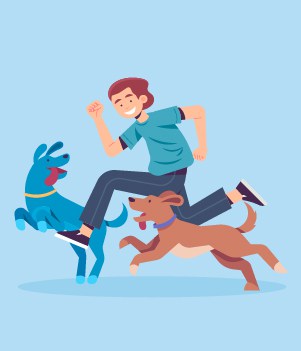
For the elderly person living alone, a dog is a great companion to have when you’re feeling lonely or when there’s nobody else to share your feelings with.
As we’ve already mentioned, dogs can give us a sense of purpose and meaning in our lives, so the companionship of a dog can help older people especially overcome periods of loneliness and depression.
If you’re someone who is suffering from anxiety or stress, there are certain breeds that are particularly calm and are suited to providing comfort, and these therapy dogs can really help people working through these more complex feelings.
Our lives are enriched by these small, canine companions, and through them, we are sometimes better able to bond with others as it opens up a clear friendly dialogue and encourages feelings of trust between people.
Companion dogs also tend to be highly intelligent and are able to pick up on the feelings and emotional state of their owner, providing a natural source of comfort with their presence alone.
Summary
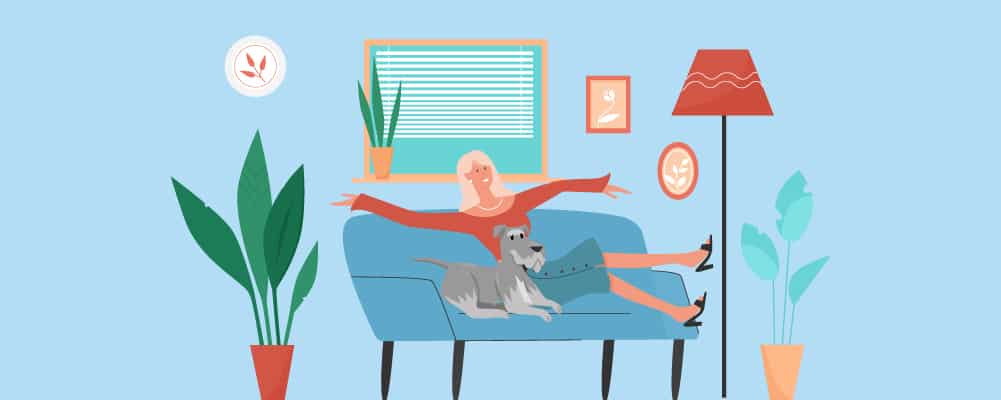
To conclude, there are a huge number of benefits that all point to why you should get a dog, so if you’re looking for that last thing to tip your partner/parent/housemate over the edge into the “yes, let’s go for it!” camp, then you might as well print out this article right now!
However, that’s not to say that owning a dog doesn’t come with its disadvantages. Dogs are and will be for the duration of their life, a huge responsibility.
Say goodbye to last-minute holidays or dinner reservations that extend to multiple drinks; your new normal will be scooping up poop, going for walkies in all weather, and putting your pet’s needs before your own.
But with everything you put in, you’ll get unconditional love from your dog in return.
Just remember to think carefully before choosing what type of breed you’re going to get, and make sure it’s going to be a good fit for your lifestyle.
Always check your breeder out to make sure they’re reputable and try to see the living conditions of the pups with their mum.
Alternatively, why not consider adopting a dog? Rehoming a rescue dog will have the added benefit of knowing that you’ve given a dog who may not have had the best start in life a new family and a new home, for which they will love you forever.
We hope we’ve managed to convince you (or a partner, parent, or another household member) of all the health benefits that come with owning a dog.